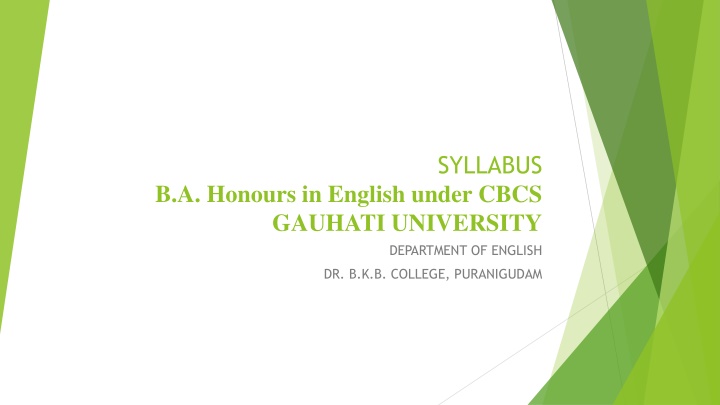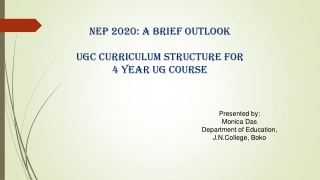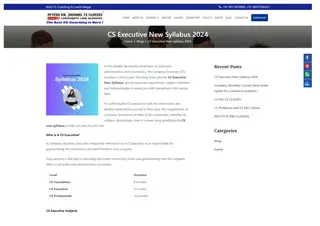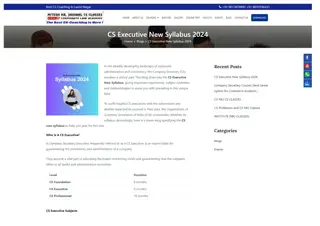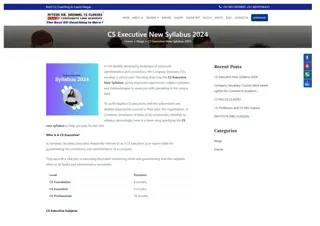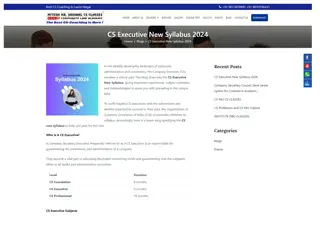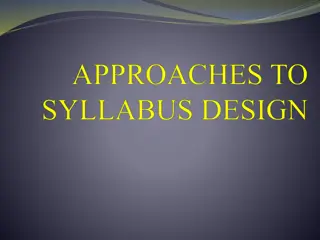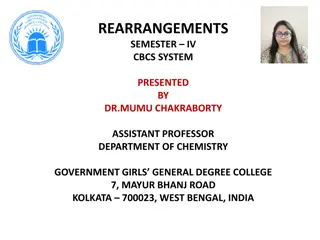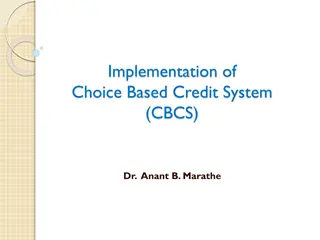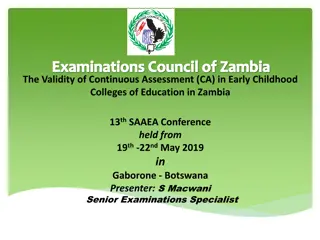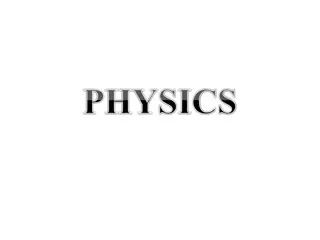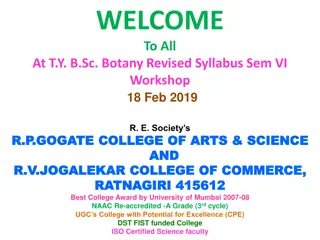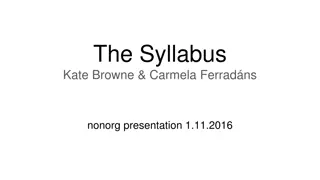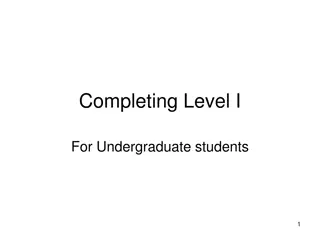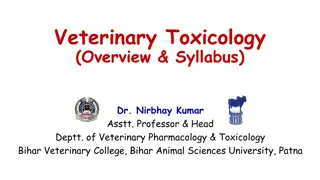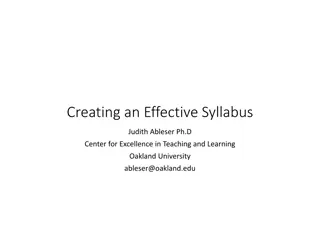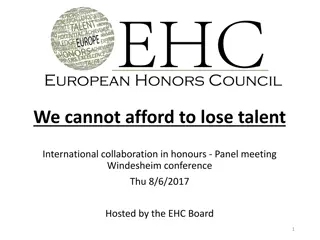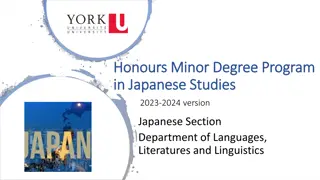Detailed Syllabus for B.A. Honours in English under CBCS
This detailed syllabus outlines the curriculum for B.A. Honours in English under the CBCS at Gauhati University, Department of English, Dr. B.K.B. College, Puranigudam. It covers major papers, ability enhancement courses, generic modules, and suggested topics for presentations, focusing on Indian and European classical literature. The syllabus emphasizes exploring diverse literary genres and cultural exchange possibilities.
Download Presentation

Please find below an Image/Link to download the presentation.
The content on the website is provided AS IS for your information and personal use only. It may not be sold, licensed, or shared on other websites without obtaining consent from the author.If you encounter any issues during the download, it is possible that the publisher has removed the file from their server.
You are allowed to download the files provided on this website for personal or commercial use, subject to the condition that they are used lawfully. All files are the property of their respective owners.
The content on the website is provided AS IS for your information and personal use only. It may not be sold, licensed, or shared on other websites without obtaining consent from the author.
E N D
Presentation Transcript
SYLLABUS B.A. Honours in English under CBCS GAUHATI UNIVERSITY DEPARTMENT OF ENGLISH DR. B.K.B. COLLEGE, PURANIGUDAM
SCHEME FOR CHOICE BASED CREDIT SYSTEM B.A. Honours (English) SEMESTER Major Paper Marks Ability Enhancement Compulsory Course (AECC) Marks Generic Marks First Semester Paper I 20+80=100 English Communication 20+80=100 GE 1 20+80=100 Paper II 20+80=100
Detailed Syllabus B. A. Honours English under CBCS Semester I 1. Paper 1: ENG-HC-1016 Indian Classical Literature * Credits: 5 (Theory) + 1 (Tutorial) * Marks: 80 (End-Semester Examination) + 20 (Internal Assessment) 2. Paper 2: ENG-HC-1026 European Classical Literature * Credits: 5 (Theory) + 1 (Tutorial) * Marks: 80 (End-Semester Examination) + 20 (InternalAssessment)
Detailed Syllabus: PAPER I This paper introduces students to a selection of literatures of India in English translation. Given that Indian Classical Literature offers a rich and diverse canvas that spans across genres like drama, poetry, the epic narrative as well as short fictional fables, to name a few, it is essential that students studying English literature are familiar with at least a few of these. This paper encourages students to think laterally about literatures of the world, and the possibility of cultural exchange.
PAPER:I Texts: 1. Kalidasa: Abhijnana Shakuntalam, tr. Chandra Rajan, in Kalidasa: The Loom of Time (New Delhi: Penguin, 1989). 2. Vyasa: The Dicing and The Sequel to Dicing, The Book of the Assembly Hall , The Temptation of Karna , Book V The Book of Effort , in The Mahabharata: tr. and ed. J.A.B. van Buitenen (Chicago: Brill, 1975) pp. 106 69. 3. Sudraka: Mrcchakatika, tr. M.M. Ramachandra Kale (New Delhi: Motilal Banarasidass, 1962). 4. Ilango Adigal: The Book of Banci , in Cilappatikaram: The Tale of anAnklet, tr. R. Parthasarathy (Delhi: Penguin, 2004) book 3.
Suggested Topics for Class Presentations Topics: The Indian Epic Tradition: Themes and Recensions Classical Indian Drama: Theory and Practice Alankara and Rasa Dharma and the Heroic
SUGGESTED Readings: Bharata, Natyashastra, tr. Manomohan Ghosh, vol. I, 2nd edn (Calcutta: Granthalaya, 1967) chap. 6: Sentiments , pp. 100 18. Iravati Karve, Draupadi , in Yuganta: The End of an Epoch (Hyderabad: Disha, 1991) pp. 79 105. J.A.B. Van Buitenen, Dharma and Moksa , in Roy W. Perrett, ed., Indian Philosophy, vol. V, Theory of Value: A Collection of Readings (New York: Garland,2000) pp. 33 40. Vinay Dharwadkar, Orientalism and the Study of Indian Literature , in Orientalismand the Postcolonial Predicament: Perspectives on South Asia, ed. Carol A.Breckenridge and Peter van der Veer (New Delhi: OUP, 1994) pp. 158 95.
PAPER:II ENG-HC-1026 European Classical Literature Classical writing in Europe saw the emergence of traditions that cut across many genres, which included poetry, theatre, and general discourses. While the Aristotelian focus on the examination of the essentials incorporate discussions on epic and drama, subsequent writers such as Horace drew attention to the purposefulness of the creative exercise. In the theatre the widely divergent compositions by Sophocles and Plautus respectively show the consolidation of a rich cultural discourse. It is this enriching literary tradition that this paper seeks to familiarize with through the study of representative texts belonging to the Classical Period. of poetry extended to
PAPER:II Texts: Homer: The Odyssey, tr. E.V. Rieu (Harmondsworth: Penguin, 1985) Book I Sophocles: Oedipus the King, tr. Robert Fagles in Sophocles: The Three Theban Plays (Harmondsworth: Penguin, 1984). Plautus: Pot of Gold, tr. E.F. Watling (Harmondsworth: Penguin, 1965). Ovid: Selections from Metamorphoses Bacchus , (Book III), Pyramus and Thisbe (Book IV), Philomela (Book VI), tr. Mary M. Innes (Harmondsworth: Penguin, 1975). Horace: Satires I: 4, in Horace: Satires and Epistles and Persius: Satires, tr. Niall Rudd (Harmondsworth: Penguin, 2005).
Suggested Topics For Class Presentations Topics: The Epic Comedy and Tragedy in Classical Drama TheAthenian City State Catharsis and Mimesis Satire Literary Cultures inAugustan Rome
SUGGESTED Readings: Aristotle, Poetics, translated with an introduction and notes by Malcolm Heath, (London: Penguin, 1996) chaps. 6 17, 23, 24, and 26. Plato, The Republic, Book X, tr. Desmond Lee (London: Penguin, 2007). Horace, Ars Poetica, tr. H. Rushton Fairclough, Horace: Satires, Epistles and Ars Poetica (Cambridge Mass.: Harvard University Press, 2005) pp. 451 73.
